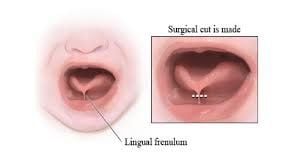This is an automatically translated article.
Stiff tongue is a phenomenon that appears at birth, which limits the range of movement of the tongue. Tongue stiffness often makes it difficult for babies to suckle or stick out their tongues. Stiff tongue can also affect the way a child eats, speaks, and swallows. In some cases, tongue stiffness does not cause problems or difficulties in functioning. In some cases, surgery may be necessary.
1. Symptoms
Signs and symptoms of tongue stiffness include:
Difficulty lifting your tongue to your upper teeth or moving your tongue from side to side Difficulty sticking your tongue out through your lower front teeth Heart shaped or V-shaped tongue when stuck

Khó lè lưỡi là một triệu chứng phổ biến của bệnh cứng lưỡi
2. When to see a doctor?
Need to see a doctor if:
The child has signs of tongue hardening that interferes with daily activities, for example, difficulty with breastfeeding Affects the child's language development. Example a child's speech speed is affected For older children, they may have difficulty eating or touching their tongue to the front teeth When you feel uncomfortable with the symptoms of tongue stiffness
3. Cause
Disease caused by abnormality of tongue anatomy. Normally, the tongue brake usually separates before birth, allowing the tongue to work unlimitedly in the oral cavity. With tongue stiffness, the tongue brake remains attached to the base of the tongue. The cause of this birth defect is still unknown. However, scientists believe that the disease is related to genetic factors.

Giải phẫu lưỡi là nguyên nhân gây ra bệnh cứng lưỡi
4. Risk factors
Hard tongue disease can affect anyone, but it is more common in boys than girls. Stiff tongue sometimes runs in family members due to genetic factors.
5. Complications
Tongue stiffness can affect the development of the oral cavity, as well as the way your baby eats, speaks and swallows. Tongue hardening can lead to:
Breastfeeding problems : Breastfeeding requires the baby to keep his or her tongue over the lower gum during feeding. If the child cannot move the tongue or keep it in this position, the baby may chew instead of sucking on the nipple. This can cause significant nipple pain and interfere with your ability to suckle. It can eventually lead to children not getting enough nutrition and not growing well. Difficulty speaking: Tongue hardening can make it difficult for a child to pronounce certain sounds, for example - such as "t," "d," "z," "s," "th," "r" and "l." Poor oral hygiene: For an older child or adult, a stiff tongue can make it difficult to sweep food debris from the teeth. In the long run, it can easily lead to tooth decay and gingivitis. Tongue hardening can also lead to the formation of a space between the two lower front teeth. Difficulty with other mouth functions: Stiffness of the tongue can make certain activities difficult, such as licking an ice cream cone, licking lips, kissing, or playing a wind instrument.

Bệnh nhân bị cứng lưỡi gặp khó khăn trong việc vệ sinh răng miệng
Vinmec International General Hospital is a high-quality medical facility in Vietnam with a team of highly qualified medical professionals, well-trained, domestic and foreign, and experienced.
A system of modern and advanced medical equipment, possessing many of the best machines in the world, helping to detect many difficult and dangerous diseases in a short time, supporting the diagnosis and treatment of doctors the most effective. The hospital space is designed according to 5-star hotel standards, giving patients comfort, friendliness and peace of mind.
Please dial HOTLINE for more information or register for an appointment HERE. Download MyVinmec app to make appointments faster and to manage your bookings easily.
Reference source: mayoclinic.org













